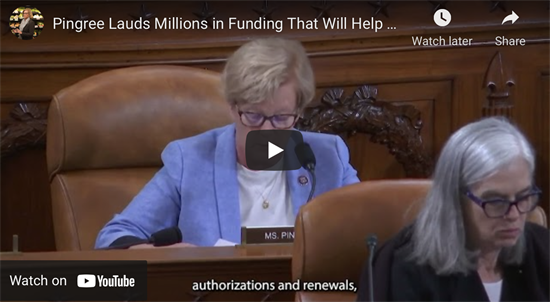Press Releases
VIDEO: In Appropriations Committee, Pingree Secures Millions to Offset Asylum Seeker Emergency Shelter Costs, Speed up Work AuthorizationThe Homeland Security Appropriations bill for Fiscal Year 2023 significantly increases funding for FEMA’s Emergency Food and Shelter Program as well as humanitarian assistance for families at the southern border
Washington,
June 27, 2022
Senior House Appropriations Committee Member Congresswoman Chellie Pingree (D-Maine) has successfully fought for millions of federal dollars in the Fiscal Year 2023 House Appropriations package to help asylum seekers and Maine communities supporting them. In a full House Appropriations Committee markup on Friday, Pingree shed light on the City of Portland’s ongoing financial challenges to accommodate new Mainers, which have been exacerbated by the pandemic and an influx of asylum seekers. “I'm proud to have these new neighbors who are so willing and eager to contribute to their new home. The city of Portland, the surrounding towns, nonprofit and advocacy groups, are doing truly heroic work to make sure these families have the shelter and resources they need to begin putting down roots in the community,” Congresswoman Pingree said in her remarks to the Committee. “Unfortunately, the situation has been exacerbated by the pandemic and housing shortages. And the city of Portland and its partners are seriously in need of more resources. So, I just want to say I'm very pleased this bill adds $126 million, a significant resource and increase to FEMA's Emergency Food and Shelter Program, which helps to fund urgent and basic needs like meals, temporary housing, and transportation—things we all know are getting increasingly expensive.” The $85.67 billionHomeland Security Subcommittee FY23 funding bill, which was approved by the Appropriations Committee on Friday:
Background: In February, Pingree reintroduced her Asylum Seeker Work Authorization Act, which would reduce the waiting period for work authorization eligibility to 30 days, allowing an asylum seeker to apply for authorization as soon as the asylum claim is filed. Earlier this year, Pingree joined Governor Mills and Senators Collins and King in urging President Biden and FEMA to extend funding that has helped the city of Portland pay for emergency shelter during the COVID-19 pandemic. The FY2022 Appropriations package, which passed with Pingree’s strong support, allowed the Administration to continue its cost sharing measures through to July, rather than expire on April 1. Last month, Pingree and six of her Congressional colleagues urged DHS to open a formal review of the Boston Asylum Office operated by USCIS following a report that only 15.5 percent of asylum applications it reviewed between 2015 and 2020 were approved. Pingree has been a member of the House Appropriations Committee since 2013 and has served as Chair of the House Appropriations Subcommittee on Interior, Environment, and Related Agencies since January 2021. -- I just wanted to speak briefly about the many good provisions in this bill that will help new asylum seekers and the communities that welcome them. You might not realize this, but Portland, Maine is actually a major destination for asylum seekers entering this country, and it has been a great thing. We have one of the oldest, if not the oldest state in the nation, and we need people to move to our state. And I'm proud to have these new neighbors who are so willing and eager to contribute to their new home. The city of Portland, the surrounding towns, nonprofit and advocacy groups, are doing truly heroic work to make sure these families have the shelter and resources they need to begin putting down roots in the community. Unfortunately, the situation has been exacerbated by the pandemic and housing shortages. And the city of Portland and its partners are seriously in need of more resources. So, I just want to say I'm very pleased this bill adds $126 million, a significant resource and increase to FEMA's Emergency Food and Shelter Program, which helps to fund urgent and basic needs like meals, temporary housing, and transportation ... things we all know are getting increasingly expensive. The bill also ensures that $150 million of the total funding for this program will be set aside to provide humanitarian assistance, specifically to individuals and families encountered at the southern border. The bill also includes more funding to reduce backlogs at USCIS, including delays in securing work authorizations and renewals, which has been a critical problem in recent months. Right now, asylum seekers are forced to wait six months before they can receive a work permit, which puts unnecessary strain on emergency resources. I have a bill to shorten that waiting period to 30 days to allow people to begin supporting themselves and their families much faster. But in the meantime, there's much more we need to do to streamline the process at USCIS. I thank the chair for including language in today's bill to improve the process to apply for a work permit and ensure oversight of USCIS to make data about pending applications more publicly available. With the right resources, there's a lot of opportunities for communities in welcoming of asylum seekers and other immigrant groups. Thank you again to the chair for her work on this issue, and I yield back. ### |

